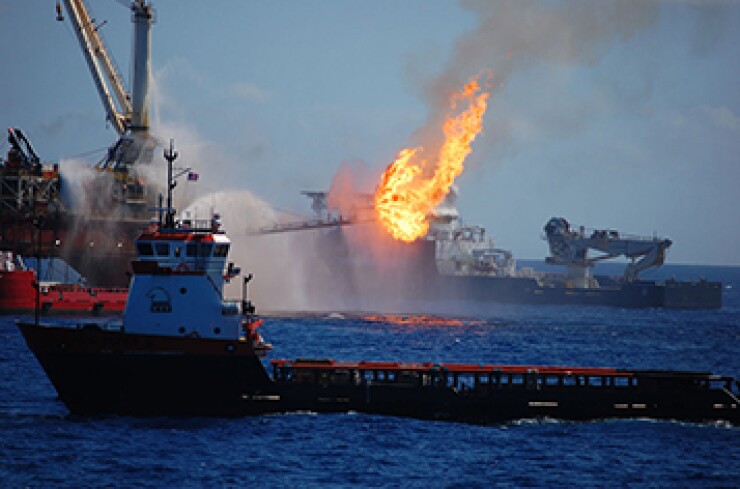
DALLAS -- Alabama plans to issue $652 million of bonds Thursday secured by settlement payments stemming from the Deepwater Horizon oil spill in the Gulf of Mexico.
The debt will securitize payments U.K. oil producer BP Plc agreed to make to Alabama as part of its settlement with five Gulf Coast states for damage caused by the 2010 disaster, in which a well blow out triggered an explosion on the drilling rig Deepwater Horizon, killing 11 rig workers and spilling more than 3 million barrels of oil into the gulf over three months. The National Oceanic and Atmospheric Administration calls it the largest oil spill in U.S. waters.
The Alabama bonds look a lot like tobacco settlement securitizations, in that the state is passing through payments and associated credit risk from a corporate entity to bondholders.
However, there are important distinctions.
Clinton Carter, Alabama's director of finance, says that while both tobacco securitizations and the Deepwater Horizon deal involve a unique corporate credit, the big difference is that in tobacco bonds the payments were variable.
"Debt payment on the bonds was based upon an unknown number which was based on cigarette consumption," said Carter. "They expected tobacco consumption to be fairly flat in the future but nobody knew what these numbers were going to be and in fact consumption declined."
The BP settlement bonds, in contrast, are not affected by oil prices or consumption and offer bondholders the security of payments that are fixed for the next 18 years at $53.3 million.
"We know what they are going to be and they are not going to change," said Carter.
The $110 million of 2016-A, tax exempt bonds and the $542 million of 2016-B federally taxable bonds monetize the settlement payments. Those payments have been pledged to the repayment of these bonds. The state, through the Alabama Economic Settlement Authority, will pay debt service.
Morgan Stanley and Raymond James are the lead underwriters on the transaction. Balch & Bingham, PC is the bond counsel.
Moody's Investors Service rates the bonds A2 with a stable outlook, and S&P Global Ratings assigns its A-minus rating with a stable outlook.
"Tobacco payment obligations are payments made by multiple tobacco companies, with payments based on market share, inflation, and other factors, whereas the BP settlement is for a fixed payment spelled out in the settlement agreement between just one company, BP, and the State of Alabama," said Julius Vizner, assistant vice president and analyst at Moody's.
Vizner said that as a result the bonds reflect BP's A2 rating and positive outlook, "as opposed to the more complex factors affecting tobacco securitization ratings."
The statutory appropriation of pledged revenues by the State of Alabama caps the rating at the state's Aa1.
Alabama plans to use the securitization proceeds to repay money the state borrowed from its rainy day reserve to balance the budget in previous years and amounts borrowed from the Alabama Trust Fund, an account for oil and gas capital royalty payments typically used for economic development programs.
The state also plans to use the proceeds to pay Medicaid expenses and fund road projects.
Carter said that $400 million from the deal will be used to replenish the state's account; $120 million will go to the state's Medicaid agency and the rest, which is around $120 million, will be used by the state's Department of Transportation to fix roads in Baldwin and Mobile counties.
Louisiana, Florida, Alabama, Mississippi and Texas will receive coastal and economic damage compensation totaling about $14.6 billion. The settlement includes another $5.5 billion in civil Clean Water Act penalties.
Alabama gets $1.3 billion for coastal restoration projects and $1 billion for economic claims.
State lawmakers in September approved the bond sale and authorized creation of the Alabama Economic Settlement Authority.
The first two payments, which include a $100 million payment in April and a scheduled $50 million payment in April 2017, are not part of the securitization structure.





